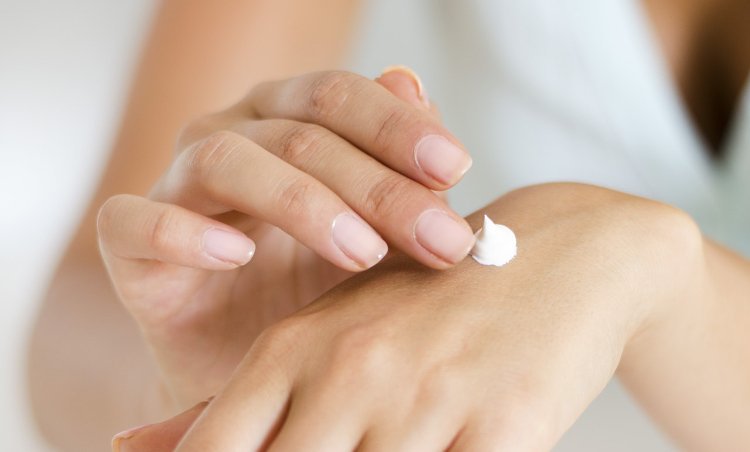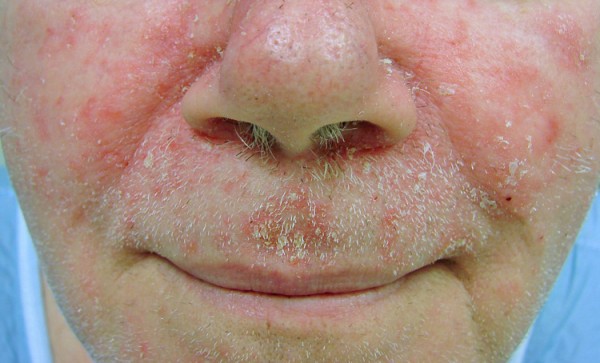An inflammatory skin condition, seborrheic dermatitis is likely the single most common skin condition that affects individuals other than acne. Characterized by red, scaling skin that most often affects the scalp, brows, mid-face, ears, chest, and mid-back, the condition is more commonly thought of as cradle cap in infants and a primary cause of dandruff in adults.
While treatable, the condition is incurable, so knowing how to effectively manage the symptoms and keep flare-ups at bay is important. Consider these seborrheic dermatitis treatment options and determine what path of management is right for you.
Conventional Seborrheic Dermatitis Treatment
Most seborrheic dermatitis treatments aim at managing the symptoms of the condition, as there is no cure for the condition itself. That said, dandruff is one of most common and most bothersome symptoms for individuals. So conventional treatment often centers on treating the red, itchy scalp. Common medicinal treatments of the condition include:
Medicated Shampoo

There are a variety of medicated soaps and shampoos for treating dandruff available over-the-counter today. These remedies often function to soften the skin as well as remove excess buildup of dead skin cells on the scalp. Some of the most effective medicated shampoo options include:
- Tar Shampoo. Tar shampoo is a keratolytic agent that contains both sulfur and salicylic acid. The only drawback of this shampoo is that it often causes irritation to the surrounding skin it touches as well as light sensitivity.
- Selenium Sulfide Shampoo. This type of shampoo actually functions to treat any underlying infection that may be present in combination with the condition. Eliminating infection serves to reduce itch and remove excess skin. Selenium sulfide shampoo is known for causing hair loss, discoloration, and additional skin irritation, though.
- Zinc Pyrithione Shampoo. This shampoo is an effective antifungal and antibacterial option that is often prescribed. Fortunately, this treatment is one of the least expensive options, and it is only known to have one side effect – skin irritation.
Topical Creams & Gels

Your dermatologist may also prescribe topical treatments to help relieve your condition. These medications are generally broken down into similar categories. The most commonly prescribed topical treatments include:
- Topical corticosteroids.
- Antifungal shampoos.
- Topical antifungals.
- Topical calcineurin inhibitors.
Each of these treatment options serves a specific purpose related to the condition. Calcineurin inhibitors are one of the most aggressive treatments and serve to regulate the body’s inflammatory responses by acting on the immune system.
Unfortunately, these agents too have numerous side effects, such as stinging of the skin, cough, fever, atrophy of the skin, upper respiratory infection, and others. The specific long-term effects of calcineurin inhibitors are currently unknown; however, there have been some isolated cases of skin cancer confirmed. It is important to use these medications only as directed by your physician and only for a short period of time at that.
Lifestyle Remedies for Seborrheic Dermatitis
Many individuals choose to err on the side of caution when it comes to seborrheic dermatitis treatment. In that case, there are many lifestyle remedies that reduce your risk of flares that are not quite as abrasive as other medicinal options. Many individuals have to try several combinations of products or treatment options before finding the right one for their skin, so keep that in mind as you begin looking for the best treatment for you.
Mineral Oil

Mineral oil functions to soften your scalp and can make removing scales easier. To use this remedy, you’ll need to apply the oil to your scalp, allow it to set for an hour or more, and then comb your hair. Once combed, wash your hair thoroughly.
Avoid Products
Many styling products can irritate the scalp and exacerbate symptoms of seborrheic dermatitis. Avoid products including hair spray, gel, and other styling products, especially those containing alcohol, to reduce your risk of irritation.
Cotton Clothing

If your condition affects other parts of your body than just your scalp, choosing cotton clothing can help. Cotton is a breathable fabric that allows air to circulate around the skin, helping reduce irritation.
Alternative Seborrheic Dermatitis Treatment
If you are wary of traditional medical treatments, then opting for alternative medicine may be a better option for you. While research is inconclusive as to the effectiveness of these remedies, many individuals report having good results with alternative medicines and adjustments to their hygiene and wellness routines.
Tea Tree Oil

Tea tree oil is a known antibacterial and antifungal agent. It is often found in many dandruff shampoos and can be used to treat underlying infection of the disease. In concentrated form the oil can cause an allergic reaction, so you may want to dilute it with a carrier oil if you choose to use the oil on its own rather than in a shampoo.
Fish Oil Supplements

Fish oil contains a high concentration of omega-3 fats. These fats help reduce inflammation and improve circulation throughout the body, which can be helpful for treating seborrheic dermatitis.
Aloe Vera

Aloe Vera helps soothe and relieve irritated skin. It functions to reduce inflammation and can also soften scaling of the skin. You can use Aloe Vera in gel form or apply it directly from the leaf of the plant.
Summing Up
Although incurable, seborrheic dermatitis is very treatable. Most seborrheic dermatitis treatment options for the condition aim at reducing symptoms, such as dandruff. There are a number of medical treatment options, including medicated shampoos and creams; however, there are also less aggressive home remedies that have fewer side effects and may also be promising.
Consider your options and discuss which treatment to follow with your doctor. You may have to try a few different treatments before finding the right one for you.

